冠词用法全解[上学期]
图片预览

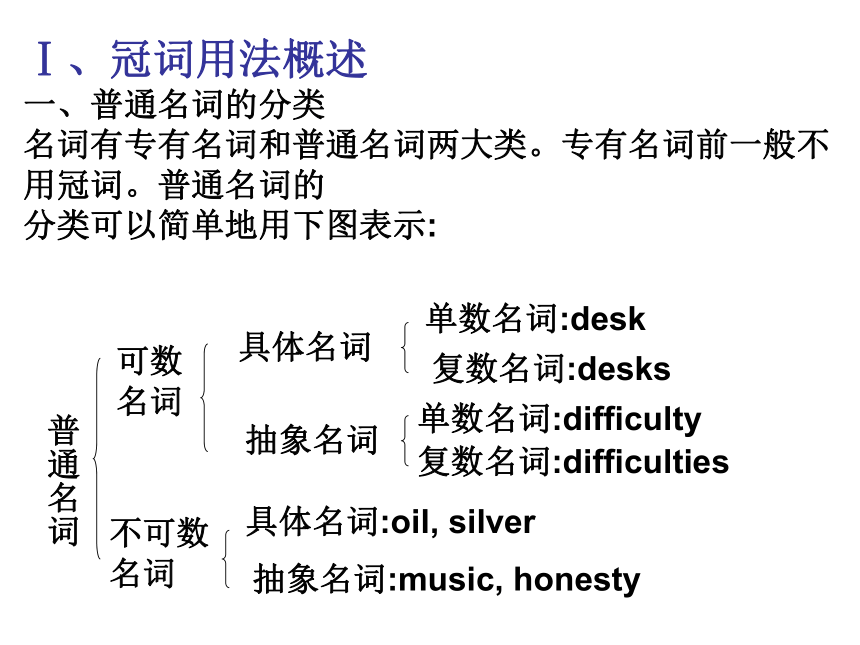
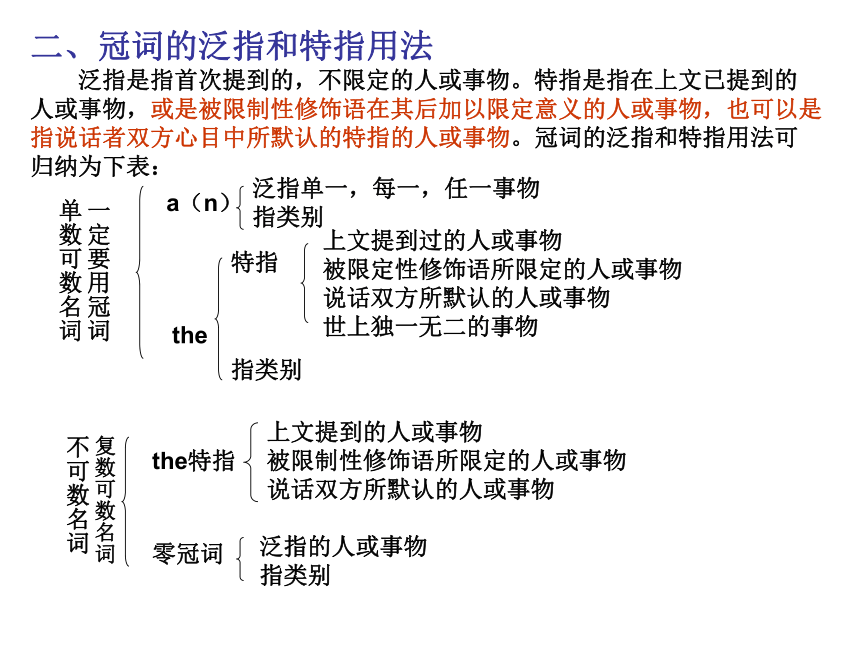
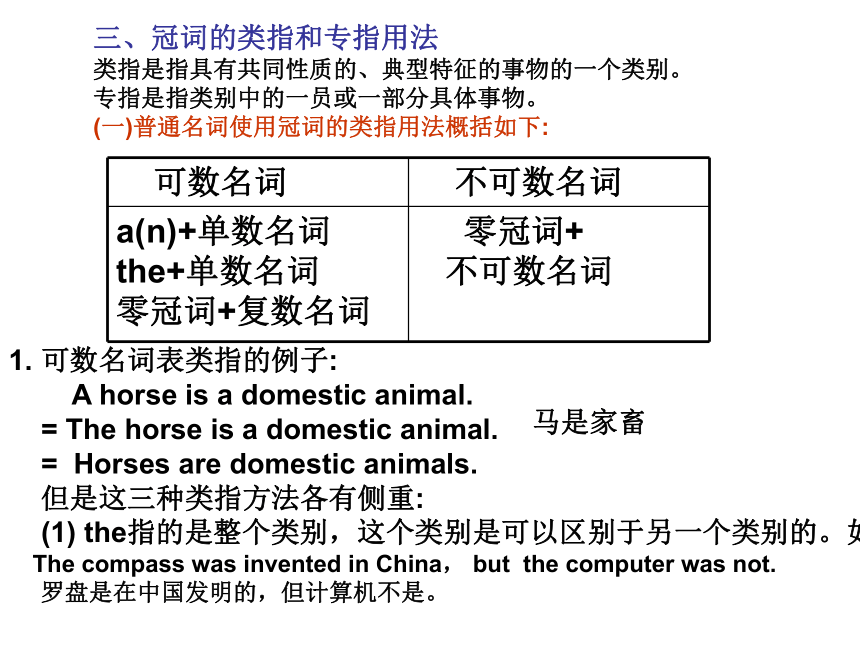
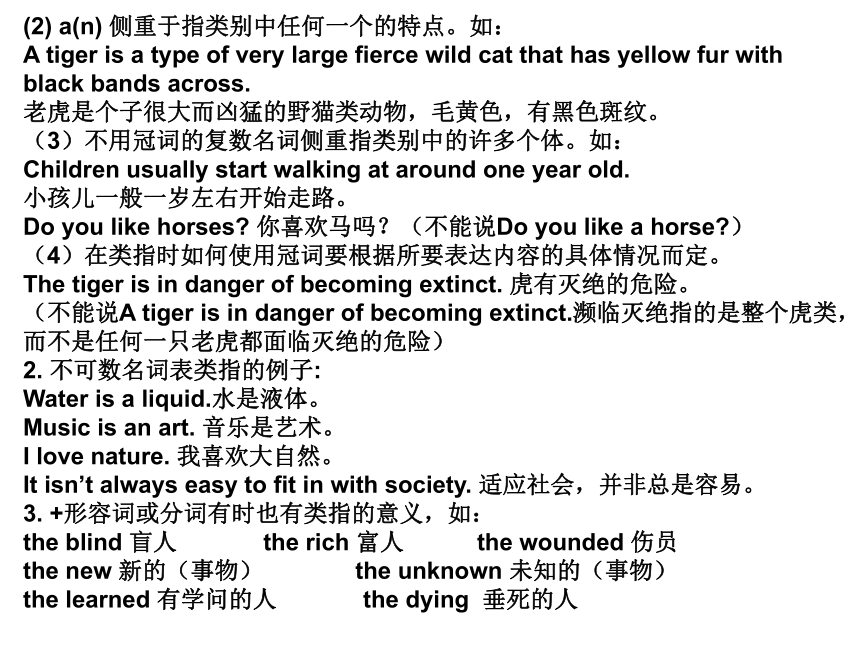
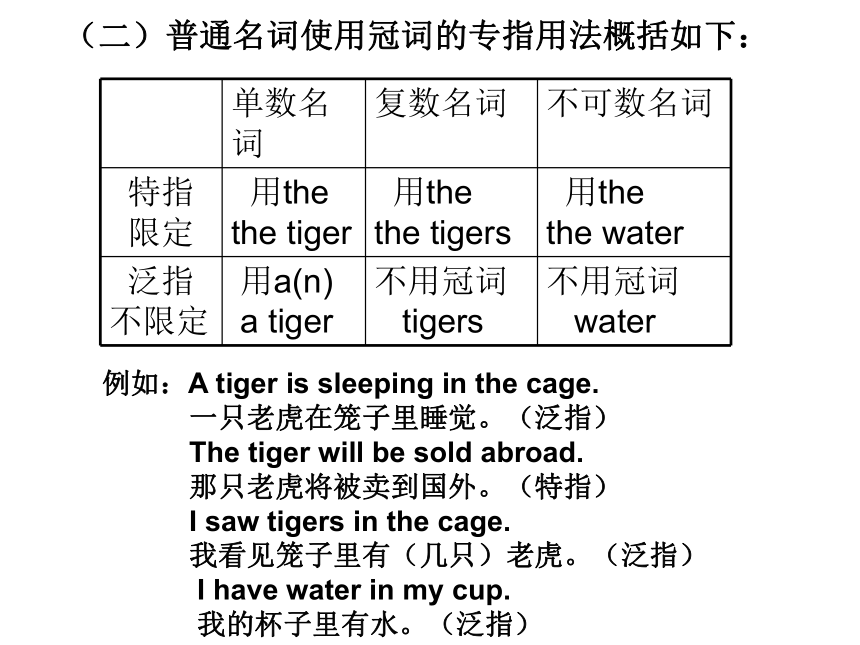
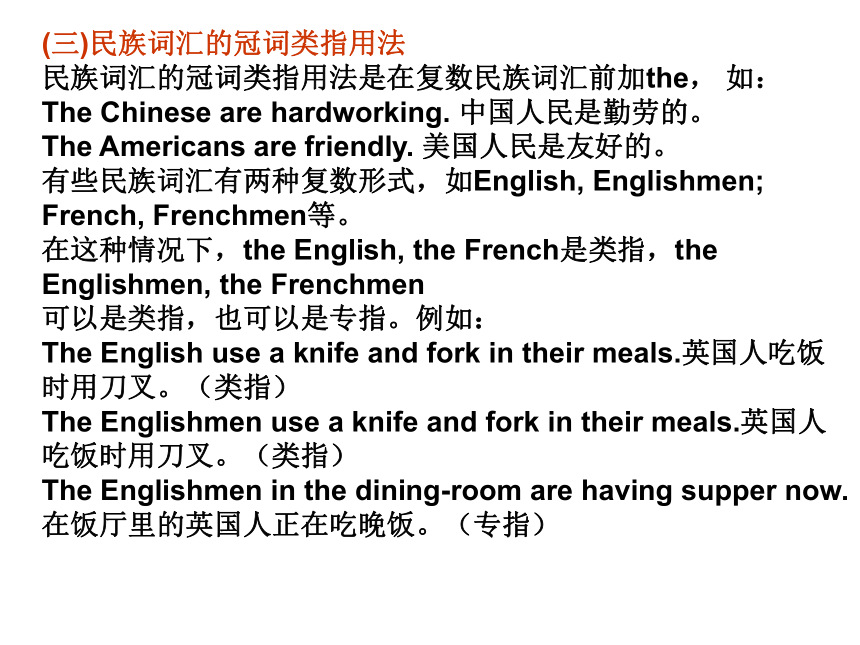
文档简介
课件15张PPT。冠 词Ⅰ、冠词用法概述
一、普通名词的分类
名词有专有名词和普通名词两大类。专有名词前一般不用冠词。普通名词的 分类可以简单地用下图表示:普通名词可数 名词不可数 名词具体名词单数名词:desk复数名词:desks抽象名词单数名词:difficulty复数名词:difficulties具体名词:oil, silver抽象名词:music, honesty二、冠词的泛指和特指用法 泛指是指首次提到的,不限定的人或事物。特指是指在上文已提到的 人或事物,或是被限制性修饰语在其后加以限定意义的人或事物,也可以是 指说话者双方心目中所默认的特指的人或事物。冠词的泛指和特指用法可 归纳为下表:一定要用冠词 单数可数名词a(n)the泛指单一,每一,任一事物
指类别特指指类别上文提到过的人或事物
被限定性修饰语所限定的人或事物
说话双方所默认的人或事物
世上独一无二的事物复数可数名词 不可数名词the特指零冠词上文提到的人或事物
被限制性修饰语所限定的人或事物
说话双方所默认的人或事物泛指的人或事物
指类别三、冠词的类指和专指用法
类指是指具有共同性质的、典型特征的事物的一个类别。 专指是指类别中的一员或一部分具体事物。
(一)普通名词使用冠词的类指用法概括如下:可数名词表类指的例子: A horse is a domestic animal. = The horse is a domestic animal. = Horses are domestic animals. 但是这三种类指方法各有侧重: (1) the指的是整个类别,这个类别是可以区别于另一个类别的。如:
The compass was invented in China, but the computer was not. 罗盘是在中国发明的,但计算机不是。马是家畜(2) a(n) 侧重于指类别中任何一个的特点。如: A tiger is a type of very large fierce wild cat that has yellow fur with black bands across. 老虎是个子很大而凶猛的野猫类动物,毛黄色,有黑色斑纹。 (3)不用冠词的复数名词侧重指类别中的许多个体。如: Children usually start walking at around one year old. 小孩儿一般一岁左右开始走路。 Do you like horses? 你喜欢马吗?(不能说Do you like a horse?) (4)在类指时如何使用冠词要根据所要表达内容的具体情况而定。 The tiger is in danger of becoming extinct. 虎有灭绝的危险。 (不能说A tiger is in danger of becoming extinct.濒临灭绝指的是整个虎类, 而不是任何一只老虎都面临灭绝的危险) 2. 不可数名词表类指的例子: Water is a liquid.水是液体。 Music is an art. 音乐是艺术。 I love nature. 我喜欢大自然。 It isn’t always easy to fit in with society. 适应社会,并非总是容易。
3. +形容词或分词有时也有类指的意义,如: the blind 盲人 the rich 富人 the wounded 伤员 the new 新的(事物) the unknown 未知的(事物) the learned 有学问的人 the dying 垂死的人(二)普通名词使用冠词的专指用法概括如下:例如:A tiger is sleeping in the cage. 一只老虎在笼子里睡觉。(泛指) The tiger will be sold abroad. 那只老虎将被卖到国外。(特指) I saw tigers in the cage. 我看见笼子里有(几只)老虎。(泛指) I have water in my cup. 我的杯子里有水。(泛指)(三)民族词汇的冠词类指用法
民族词汇的冠词类指用法是在复数民族词汇前加the, 如: The Chinese are hardworking. 中国人民是勤劳的。 The Americans are friendly. 美国人民是友好的。 有些民族词汇有两种复数形式,如English, Englishmen; French, Frenchmen等。 在这种情况下,the English, the French是类指,the Englishmen, the Frenchmen 可以是类指,也可以是专指。例如: The English use a knife and fork in their meals.英国人吃饭时用刀叉。(类指) The Englishmen use a knife and fork in their meals.英国人吃饭时用刀叉。(类指) The Englishmen in the dining-room are having supper now. 在饭厅里的英国人正在吃晚饭。(专指)Ⅱ. 冠词的惯用法
一、a(n) 的惯用法 1. 表示“同一”,相当于the same。如: The two boys are of an age. 那两个男孩同岁。 Cotton of a kind was stored together in a house. 2. 用在某些物质名词或抽象名词前,表示“一种、一类、一份、一场、一阵…”如: That’s a green tea. 那是一种绿茶。 They were caught in a heavy rain. 他们淋了一场大雨。 It’s a great pleasure to have a talk with you. 3. 用于专有名词之前表示类似的一个或某一个。(some) A Mr. Li is asking to see you at the school gate.一位李先生在校门口要见你。 4.用于某些固定词组中。如: (1)have a swim/walk/talk/dance/look/quarrel=swim/walk/talk/dance/look/quarrel. ( 2)have a cold; have a good time; keep a diary; in a hurry; once in a while; at a loss(不知所措); for a while; once upon a time; all of a sudden; tell a lie; do sb. a favour; get an education(受教育);at a mouthful(一口); at a distance(隔离一段时间) (3)what a/such a/quite a rather a+单数可数名词;
too/as/so/how/however+adj.+a+单数可数名词;
many a+单数可数名词:许多;
not a+单数可数名词:不止一个; half a+单数可数名词:一半。二、the的惯用法
1、用在姓氏复数形式前,表示一家人。如: The Greens are at table. 格林一家正在吃饭。 The Chens will move to Nanjing. 陈的一家要搬到南京去。 2、用在年代、朝代、时代名词前。 the Tang dynasty, the Spring and Autumn Period, in the 1870’s 在19世纪70年代 3、用在作为课程或演奏等的乐器名称前。 He plays the violin but gives lessons on the piano. 他是拉小提琴的,但是他教钢琴课。 但We have a piano in our house. 我们家有一架钢琴。 4、用在表示单位的名词前。如: I have hired the car by the hour. 我已按小时租车。 Eggs are sold by the dozen. 鸡蛋论打卖 by the day (month) 按日(月) by the yard (foot) 按码(英尺) 5、用在方向名词和某些表示时间的名词前。如: on the right/left 在右/左边 in the east 在东边 the other day几天前 in the daytime在白天 in the end最后 6、用于表示物质环境—我们周围的世界和气候,或我们生活中其他常见的特点的词组。 用the表示所谈之物是人人都熟悉的。如: the country乡村 the fog雾 the sea 海 the seaside海滨 the night 夜 the sunshine阳关 the universe 宇宙 the future未来三、零冠词的惯用法
1、在季节、月份、星期、节假日、学科、三餐和球、棋类名词前。如: Spring follows winter.冬去春来。 We have few classes on Saturday. He studies biology at university. 比较:They came to Beijing in the winter of 1997. This happened on a Sunday toward the end of June. 这件是发生在六月末的一个星期天。 We had a wonderful lunch in the home of Mr Wang. 2、称呼语或表头衔的名词(作表语、同位语、补足语)前。如: Comrade Li was chairman of the meeting. We elected him president of our university. 3、表抽象意义或一般意义的时间名词前。如: at daybreak; at sunrise; at sunset; at noon; at midday; at night; at midnight; before (after) dark; from dawn until dark; from morning till night 4、表乘交通工具的短语中。如: by bike; by car; by boat; by plane (air); by train; on foot; on horseback 比较:on a bike; in a car; in (on) a (the) train (a carriage, a bus); on a (the) ship; take a bus; catch the train; ride in a bus.5、单数可数名词前不用a (n) 的情况: (1)连系动词turn后的单数可数名词作表语时。 After graduation from college he turned teacher (became a teacher). 大学毕业后,他成了一名教师。 (2)Child as/though he is, he knows a lot. 但:Though he is a child, he knows a lot. 尽管他是个小孩,但却懂得很多。 (3)man意为“人类‘, word意为”消息“时,其前不用冠词。例: Word came that the Chinese Women Football Team won the second prize in World Cup. 6、在下列表示行为、状态、特征、原因以及说明方式、目的等的固定习语中。 at breakfast(吃早饭时)/at table(吃饭)/at dinner(吃饭)/in class(在课堂上)/in court(出庭作证)/in debt(欠债)/in danger(处境危险)/in good (poor)health身体健康 (不健康)/in good condition(状态好)/in great demand/in great need/in motion(在运动中)/in time of danger/in office(就职)/in trouble (difficulty)/in surprise/in honour of/in favor of/with anger/in colour/in general/in size/in length/in character(在性格上)/in sight/in (out of) order/in fact/on business/on holiday/on leave(休假)/on strike/on watch/on fire/on time.四、有定冠词与无定冠词的区别吃饭 坐在桌旁 在海边
茫然
负责……
由……负责,在……掌管之下
在白天
按日计算
发生
代替
拥有
为……所有
能看见
据……的见解
代替
在……的地方
成年
同龄
sit at table
sit at the table
at the sea
at sea
be in charge of
be in the charge of
by day
by the day
take place
take the place of
in possession of
in the possession of
in sight of
in the sight of
in place of
in the place of
be of age
be of an age四、有定冠词与无定冠词的区别征求意见
听从劝告
他仍在执政
他仍在办公室
那是毫无疑问的.
那是根本不可能的.
take advice
take the advice
He is still in office.
He is still in the office.
It is out of question.
(=beyond question)
It is out of the question
(=impossible) in future / in the future ; in front of / in the front of in bed / church / prison / town睡觉/做礼拜/蹲监狱/进城 in the bed / church / prison / town在床上/在教堂/在监狱里/在城里 go to class / hospital / school / college 上课 / 住院 / 上学 / 上大学 go to the class / hospital / school / college 到课堂 / 医院 / 学校 / 大学去
.命题趋势:
未来的高考测试将继续把惯用法和冠词的最基本用法为考查重点突破方法:
1、备考过程中,应充分重视对最基本的冠词知识的掌握和理解。
2、学习时要把握要害:
可数名词和不可数名词;具体名词和抽象名词;泛指和特指;类指和专指
一、普通名词的分类
名词有专有名词和普通名词两大类。专有名词前一般不用冠词。普通名词的 分类可以简单地用下图表示:普通名词可数 名词不可数 名词具体名词单数名词:desk复数名词:desks抽象名词单数名词:difficulty复数名词:difficulties具体名词:oil, silver抽象名词:music, honesty二、冠词的泛指和特指用法 泛指是指首次提到的,不限定的人或事物。特指是指在上文已提到的 人或事物,或是被限制性修饰语在其后加以限定意义的人或事物,也可以是 指说话者双方心目中所默认的特指的人或事物。冠词的泛指和特指用法可 归纳为下表:一定要用冠词 单数可数名词a(n)the泛指单一,每一,任一事物
指类别特指指类别上文提到过的人或事物
被限定性修饰语所限定的人或事物
说话双方所默认的人或事物
世上独一无二的事物复数可数名词 不可数名词the特指零冠词上文提到的人或事物
被限制性修饰语所限定的人或事物
说话双方所默认的人或事物泛指的人或事物
指类别三、冠词的类指和专指用法
类指是指具有共同性质的、典型特征的事物的一个类别。 专指是指类别中的一员或一部分具体事物。
(一)普通名词使用冠词的类指用法概括如下:可数名词表类指的例子: A horse is a domestic animal. = The horse is a domestic animal. = Horses are domestic animals. 但是这三种类指方法各有侧重: (1) the指的是整个类别,这个类别是可以区别于另一个类别的。如:
The compass was invented in China, but the computer was not. 罗盘是在中国发明的,但计算机不是。马是家畜(2) a(n) 侧重于指类别中任何一个的特点。如: A tiger is a type of very large fierce wild cat that has yellow fur with black bands across. 老虎是个子很大而凶猛的野猫类动物,毛黄色,有黑色斑纹。 (3)不用冠词的复数名词侧重指类别中的许多个体。如: Children usually start walking at around one year old. 小孩儿一般一岁左右开始走路。 Do you like horses? 你喜欢马吗?(不能说Do you like a horse?) (4)在类指时如何使用冠词要根据所要表达内容的具体情况而定。 The tiger is in danger of becoming extinct. 虎有灭绝的危险。 (不能说A tiger is in danger of becoming extinct.濒临灭绝指的是整个虎类, 而不是任何一只老虎都面临灭绝的危险) 2. 不可数名词表类指的例子: Water is a liquid.水是液体。 Music is an art. 音乐是艺术。 I love nature. 我喜欢大自然。 It isn’t always easy to fit in with society. 适应社会,并非总是容易。
3. +形容词或分词有时也有类指的意义,如: the blind 盲人 the rich 富人 the wounded 伤员 the new 新的(事物) the unknown 未知的(事物) the learned 有学问的人 the dying 垂死的人(二)普通名词使用冠词的专指用法概括如下:例如:A tiger is sleeping in the cage. 一只老虎在笼子里睡觉。(泛指) The tiger will be sold abroad. 那只老虎将被卖到国外。(特指) I saw tigers in the cage. 我看见笼子里有(几只)老虎。(泛指) I have water in my cup. 我的杯子里有水。(泛指)(三)民族词汇的冠词类指用法
民族词汇的冠词类指用法是在复数民族词汇前加the, 如: The Chinese are hardworking. 中国人民是勤劳的。 The Americans are friendly. 美国人民是友好的。 有些民族词汇有两种复数形式,如English, Englishmen; French, Frenchmen等。 在这种情况下,the English, the French是类指,the Englishmen, the Frenchmen 可以是类指,也可以是专指。例如: The English use a knife and fork in their meals.英国人吃饭时用刀叉。(类指) The Englishmen use a knife and fork in their meals.英国人吃饭时用刀叉。(类指) The Englishmen in the dining-room are having supper now. 在饭厅里的英国人正在吃晚饭。(专指)Ⅱ. 冠词的惯用法
一、a(n) 的惯用法 1. 表示“同一”,相当于the same。如: The two boys are of an age. 那两个男孩同岁。 Cotton of a kind was stored together in a house. 2. 用在某些物质名词或抽象名词前,表示“一种、一类、一份、一场、一阵…”如: That’s a green tea. 那是一种绿茶。 They were caught in a heavy rain. 他们淋了一场大雨。 It’s a great pleasure to have a talk with you. 3. 用于专有名词之前表示类似的一个或某一个。(some) A Mr. Li is asking to see you at the school gate.一位李先生在校门口要见你。 4.用于某些固定词组中。如: (1)have a swim/walk/talk/dance/look/quarrel=swim/walk/talk/dance/look/quarrel. ( 2)have a cold; have a good time; keep a diary; in a hurry; once in a while; at a loss(不知所措); for a while; once upon a time; all of a sudden; tell a lie; do sb. a favour; get an education(受教育);at a mouthful(一口); at a distance(隔离一段时间) (3)what a/such a/quite a rather a+单数可数名词;
too/as/so/how/however+adj.+a+单数可数名词;
many a+单数可数名词:许多;
not a+单数可数名词:不止一个; half a+单数可数名词:一半。二、the的惯用法
1、用在姓氏复数形式前,表示一家人。如: The Greens are at table. 格林一家正在吃饭。 The Chens will move to Nanjing. 陈的一家要搬到南京去。 2、用在年代、朝代、时代名词前。 the Tang dynasty, the Spring and Autumn Period, in the 1870’s 在19世纪70年代 3、用在作为课程或演奏等的乐器名称前。 He plays the violin but gives lessons on the piano. 他是拉小提琴的,但是他教钢琴课。 但We have a piano in our house. 我们家有一架钢琴。 4、用在表示单位的名词前。如: I have hired the car by the hour. 我已按小时租车。 Eggs are sold by the dozen. 鸡蛋论打卖 by the day (month) 按日(月) by the yard (foot) 按码(英尺) 5、用在方向名词和某些表示时间的名词前。如: on the right/left 在右/左边 in the east 在东边 the other day几天前 in the daytime在白天 in the end最后 6、用于表示物质环境—我们周围的世界和气候,或我们生活中其他常见的特点的词组。 用the表示所谈之物是人人都熟悉的。如: the country乡村 the fog雾 the sea 海 the seaside海滨 the night 夜 the sunshine阳关 the universe 宇宙 the future未来三、零冠词的惯用法
1、在季节、月份、星期、节假日、学科、三餐和球、棋类名词前。如: Spring follows winter.冬去春来。 We have few classes on Saturday. He studies biology at university. 比较:They came to Beijing in the winter of 1997. This happened on a Sunday toward the end of June. 这件是发生在六月末的一个星期天。 We had a wonderful lunch in the home of Mr Wang. 2、称呼语或表头衔的名词(作表语、同位语、补足语)前。如: Comrade Li was chairman of the meeting. We elected him president of our university. 3、表抽象意义或一般意义的时间名词前。如: at daybreak; at sunrise; at sunset; at noon; at midday; at night; at midnight; before (after) dark; from dawn until dark; from morning till night 4、表乘交通工具的短语中。如: by bike; by car; by boat; by plane (air); by train; on foot; on horseback 比较:on a bike; in a car; in (on) a (the) train (a carriage, a bus); on a (the) ship; take a bus; catch the train; ride in a bus.5、单数可数名词前不用a (n) 的情况: (1)连系动词turn后的单数可数名词作表语时。 After graduation from college he turned teacher (became a teacher). 大学毕业后,他成了一名教师。 (2)Child as/though he is, he knows a lot. 但:Though he is a child, he knows a lot. 尽管他是个小孩,但却懂得很多。 (3)man意为“人类‘, word意为”消息“时,其前不用冠词。例: Word came that the Chinese Women Football Team won the second prize in World Cup. 6、在下列表示行为、状态、特征、原因以及说明方式、目的等的固定习语中。 at breakfast(吃早饭时)/at table(吃饭)/at dinner(吃饭)/in class(在课堂上)/in court(出庭作证)/in debt(欠债)/in danger(处境危险)/in good (poor)health身体健康 (不健康)/in good condition(状态好)/in great demand/in great need/in motion(在运动中)/in time of danger/in office(就职)/in trouble (difficulty)/in surprise/in honour of/in favor of/with anger/in colour/in general/in size/in length/in character(在性格上)/in sight/in (out of) order/in fact/on business/on holiday/on leave(休假)/on strike/on watch/on fire/on time.四、有定冠词与无定冠词的区别吃饭 坐在桌旁 在海边
茫然
负责……
由……负责,在……掌管之下
在白天
按日计算
发生
代替
拥有
为……所有
能看见
据……的见解
代替
在……的地方
成年
同龄
sit at table
sit at the table
at the sea
at sea
be in charge of
be in the charge of
by day
by the day
take place
take the place of
in possession of
in the possession of
in sight of
in the sight of
in place of
in the place of
be of age
be of an age四、有定冠词与无定冠词的区别征求意见
听从劝告
他仍在执政
他仍在办公室
那是毫无疑问的.
那是根本不可能的.
take advice
take the advice
He is still in office.
He is still in the office.
It is out of question.
(=beyond question)
It is out of the question
(=impossible) in future / in the future ; in front of / in the front of in bed / church / prison / town睡觉/做礼拜/蹲监狱/进城 in the bed / church / prison / town在床上/在教堂/在监狱里/在城里 go to class / hospital / school / college 上课 / 住院 / 上学 / 上大学 go to the class / hospital / school / college 到课堂 / 医院 / 学校 / 大学去
.命题趋势:
未来的高考测试将继续把惯用法和冠词的最基本用法为考查重点突破方法:
1、备考过程中,应充分重视对最基本的冠词知识的掌握和理解。
2、学习时要把握要害:
可数名词和不可数名词;具体名词和抽象名词;泛指和特指;类指和专指
